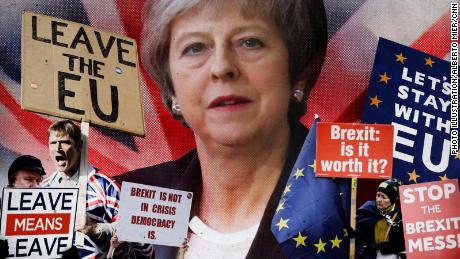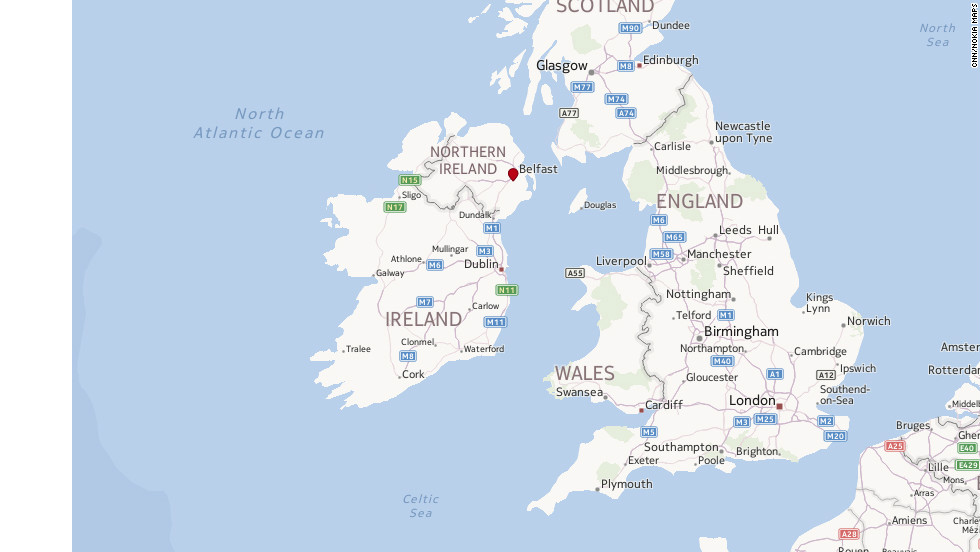London (CNN)A few years ago -- and again last year -- we published a Guide to Understanding Brexit, geared toward non-Brits.
Updated 2040 GMT (0440 HKT) March 13, 2019

Things, however, are still very complicated, and you're going to be hearing a lot about Brexit over the next couple of days.
One of the world's most powerful blocs, the European Union, is about to lose one of its biggest members, the United Kingdom. And the deadline for this seismic event is just weeks away.
So, here's Brexit decoded for non-Brits.
What is Brexit?
Britain + exit = Brexit. It's the idea (once unthinkable) that the Brits will leave the European Union. But in a stunning result, the United Kingdom voted to do just that in a bitterly fought referendum in June 2016.
Since then it's been talks, disputes, finger-pointing and threats -- just like your typical divorce.
That was three years ago. Why are we still hearing about it?
The UK is set to leave the EU on March 29, but that's about the only thing that's settled.
For months and months, the UK and the EU have been trying to hammer out a divorce deal. But, turns out untangling a 45-year marriage is not as easy as the Brexiters claimed it would be. (For one thing, no one can agree on what to do with the Irish "hard border" issue. More on that below.)
Finally, after more than two years of wrangling, British Prime Minister Theresa May came up with a draft agreement (presented here in an easy-to-read 585 pages). But when she put it up for a vote in January, British lawmakers soundly rejected it. How soundly? It was the biggest defeat for any UK government in the modern parliamentary era.

Whoa. So what's the biggest sticking point to a deal?
The Irish "hard border." The Republic of Ireland is in the EU. But Northern Ireland is part of the UK.
Right now, people (and trade) move between the two nations with ease. But there are fears that could change in a Brexit divorce because they won't be in the same EU trading bloc any more.
Normally that would require a so-called "hard border," with checkpoints, border crossings and other infrastructure. Those could seriously slow trade and other economic activity.
Irish politicians also fear a hard border could escalate tensions and require more security. (No one wants a return of the Troubles, in which more than 3,600 people were killed.)
OK, so what happens now?
Starting Tuesday, the British Parliament began voting -- on three scenarios:
- Whether the UK leaves the EU under the same withdrawal agreement May's government drafted
- Whether it leaves the EU without a deal
- Whether it votes to postpone Brexit.
- votes to postpone Brexit.
Please elaborate ...
Tuesday: This was the biggest moment of the week. The UK Parliament voted again on an EU deal under the same agreement that went down in flames in January.
Under that plan, the UK would have stayed inside the EU's single market and still be subject to EU laws and regulations until the end of 2020. So, essentially the UK would leave the EU by basically staying in it. Kind of like "Hotel California." ("You can check out anytime you like, but you can never leave.")
This vote was expected to fail -- and it did, in another shattering defeat for May.
Then, we looked to ...
Wednesday: Parliament voted again, this time on whether to leave the EU with no deal at all. That would have been the dreaded no-deal Brexit. The UK would have left the EU and traded with the world on World Trade Organization terms. Europhiles talked up the dangers of no medicine or food and hardline Brexiteers dismissed these fears as scaremongering. This no-deal Brexit vote was expected to fail -- and it did.
Now, we turn to ...
Thursday: This time, lawmakers vote on whether they want May to ask for a delay to Brexit while the UK gets its act together. This is expected to be the most contentious vote of the lot.
I don't live in the UK. Should I be concerned about any of this?
If you're a European nation: You have the most to lose -- on so many fronts. Just under half of the UK's exports go to the EU. Just over half of its imports come from the other 27 nations in the bloc. All of that is now up for a (painful) renegotiation. Then, think about diplomacy. Whenever Europe's done something useful on that front, the UK -- a serious military power -- has often been in the driver's seat. So, the EU is losing a heavyweight.
If you're the US: The world's already dangerous and volatile enough. Some in the United States may worry that the unraveling of the union -- a vital ally -- will unleash more instability. The UK also is America's seventh-biggest trading partner. Why rock the boat on such a sweet status quo?
If you're any other nation: The UK has the fifth-biggest national economy in the world. Think of the effect Brexit will have on the world's markets. Even if they don't collapse, the uncertainty is bad enough. Markets, you see, love stability. And unstable markets = potential bad news for your country's economy.
Why don't the Brits just have a re-vote on the referendum?
In all scenarios other than a no-deal Brexit, it is possible that a second vote could be put to the public. But what would UK residents vote on, exactly? Here's where things get significantly more complicated.
- First, what should the referendum question be? It can't be the original referendum question: Remain vs. leave.
- Pro-Europe types are determined to keep "no deal" off any ballot, just as hardliners believe that putting "remain" as the status quo would be a betrayal.
- Regardless, to get a second referendum back on the table would require the opposition Labour Party (which now formally backs a second vote) to put forward an amendment in Parliament. As things stand, there's no evidence it would win a majority of parliamentarians over.
But that is today. After this week's votes, things might change again.
Something has to give by March 29, right?
In the event that everything fails, then in theory the UK will have told the EU:
- It doesn't support May's deal
- BUT it doesn't want a no-deal exit
- OR to delay Brexit.
The only sensible translation of this is: "Please, give us a concession that we can accept and we will vote through May's deal and get out of your hair."
If British lawakers decide that they want to delay Brexit, then May will likely make this request at the EU Council Summit in Brussels on March 21. At that point, it's up to the other 27 EU leaders. The result of such a request is still far from certain. The EU has lots of its own problems to worry about, and having an irritable UK hanging around while it tries to hammer out a new Brexit deal is not high on the bloc's to-do list.
Wow, this is ... a lot.
We know.
https://edition.cnn.com/2019/03/11/uk/brexit-explainer-update-intl-trnd/index.html